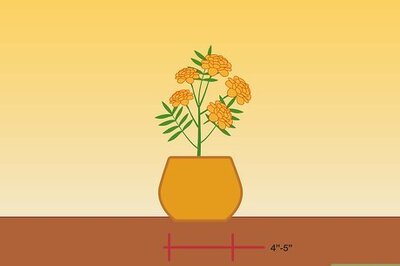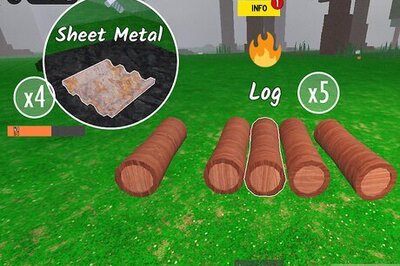
views
Bandipora: Sanderkoot Bala is a non-descript hamlet, tucked in the fringes of the frost-tipped mountains along Srinagar-Gurez road in North Kashmir’s Bandipora district.
The village is densely populated. Houses are assiduously set around a village square, which hosts a small marketplace.
The traffic on Srinagar-Bandipora road is sparse. Armoured army trucks are placed at the intersections. While in Srinagar city paramilitary troops are stationed on all the roads, the army is fanning all of north Kashmir’s roads with a patrol party being sent out every ten minutes.
A group of boys are huddled in the square and silently observing the occasional car which whizzes past them. They have been assembling in the square every morning since the clampdown was imposed in Kashmir.
Most of them are labourers but since the clampdown, they have been unable to find work. “We are in shock and don’t know what to say about the issue of Article 370,” Bilal Ahmad, 23, says with a tinge of anger in his voice. “We had not expected the government to behave brazenly and impose the decision on an issue that evokes such a sentiment in Kashmir.”
People mostly stay indoors. Those who do come out wear sullen faces. Although there has not been a call for shutdown, the shops in the village’s small marketplace remain closed.
An eerie calm prevails in the air although youths haven’t put up traffic blockades. When you talk to the people there is a palpable unease.
Since August 5— the day the Union government revoked Article 370 that granted J&K special status and divided the restive state into the two Union Territories (J&K and Ladakh) — life in Kashmir valley has been under lockdown.
Paramilitary troops, army and police personnel have occupied the streets and roads and have been keeping a check on public movement. Blockades were set up using coils of concertina wires. Restrictions are lifted in phases to give people a chance to stock up on essentials.
People like Bilal feel a sense of existential threat. With the revocation of the special status, they fear that they will not be able to find work. “Big companies will come and they will do the work that we used to get,” he fears.
Anger is brewing among the masses here but there have not been large scale protests because of the stringent clampdown. The arrest of leadership by the authorities has left the people in want of someone to rally behind. “Our local leaders who would lead us are behind bars and people like us do not have the capability to lead and the courage to face consequences,”
In the recently held parliamentary elections, Bilal and his cousin Sajad voted and campaigned for the firebrand lawmaker Engineer Rashid who stood third in terms of vote share in Baramulla constituency. “I had voted for Rashid as he had promised to work for the protection of our special status.”
The detention of the leaders who partook in the elections came as a big blow to the people. “The arrest of leaders who believe in the system was a sign of betrayal. How can we trust a state that arrested the people who bear its flag,” Bilal’s cousin Sajad Ahmad says.
Rashid who was the most vocal among the politicians on the issue of special status was summoned by the National Investigation Agency one day before the government moved to revoke Article 370. He is currently in government custody outside Kashmir.
“People say that they used to vote with the hope that the voice of politicians in parliament will hold some ground, but we were wrong,” Javid says. “Even if there are going to be elections, I don’t think they will have much significance.”
“The Indian government has no concern for the people of Kashmir. They are after our lands.”
The people have problems accepting the argument Article 370 was a bottleneck to the region’s development. “People in Kashmir are not poor unlike other parts of the subcontinent. All of us here possess the three things –roti, kapda aur makaan,” says Abdul Ahad from a shop front while discussing the prevailing situation with an elderly man, Ghulam Nabi, who expresses his agreement.
The discussion in villages is mostly centred around Kashmir’s future. People are sceptical about the government’s policy for Kashmir. “The dinner time discussions focus on the emergence of colonies of non-locals and making locals economically dependent on outsiders,” says Nabi. “The government seems adamant at changing the economy and leaving us dispossessed.”
The demarcated line between tourist, non-local labourers and men in uniform is fast vanishing. “We feel threatened by the outsiders, who will not only be the army men now,” Ahad says.

















Comments
0 comment